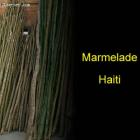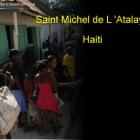ADVERTISEMENT
Earthquake - Haiti Observer Blog
Earthquake, Haiti Observer Blog. Read the following articles about Earthquake
What is an Earthquake?
Earthquakes happen every day on the earth. Most of them go unnoticed because they are minor and their effects are insignificant or not destructive at all.
What causes earthquakes?
Most quakes are as a result of pressure that accumulates within the earth crust over time. These pressures exert force at the junctions of the plates that form the earth's lithosphere. Once the forces reach certain levels the earth shakes or, sometimes, mass movement is experienced. The elements that cause the actual shaking or movement of the earth are called seismic waves. Seismic waves vary in type, size and frequency.
Goudou Goudou Has Become a Vocabulary to Mean "Quake" In Haiti
January 12, 2010 will be remembered forever by every Haitian in the world. This is the day that a great earthquake struck most places in Haiti. The victims of the earthquake say that they heard the Goudou Goudou and within no time everything had turned into a sort of hell. Goudou Goudou is an onomatopoeic name that Haitians have come to refer to the sound made by the quake. They say that the ground shake and the falling of buildings coupled with moans gave the sound similar onomatopoeic Goudou Goudou.
Haitians in the Turks and Caicos Islands face Deportation
The Turks and Caicos Islands Government announced Thursday that they will resume deportation of Haitians who were there illegally. This will affect only those who came before the January 12 2010 earthquake.
The Haitians in the Turks and Caicos Islands have been enjoying special protection after the United Nations High Commissioner for Refugees had urged governments all over the world to grant interim protection to Haitians on humanitarian grounds to those who had left Haiti.
Turks and Caicos Island has an estimated population of 32,000 people. There is a large community of Haitians who left their country in search of a better life for their family. The Turks and Caicos Islands Government says it deported 938 Haitians in 2010 and 611 in 2011.
7.6 magnitude Costa Rica earthquake: 2 dead, 7.0 magnitude Haiti earthquake: over 316, 000 dead
On September 5, 2012, a strong earthquake shook Costa Rica. The earthquake lasted one minute and 10 seconds, and was recorded 7.6 magnitude in the Richter scale.
Just two people were killed by the 7.6 magnitude earthquake in Costa Rica.
I repeat it again, only two people lost their lives
In addution, the damages were very limited in Costa Rica. It was reported that a few blocked highways and some collapsed houses were all the destructions there . Again, the death toll was two; one died of a heart attack and the another from trauma. The Red Cross had reported a total of 20 injuries as a result of earthquake in Costa Rica
Emergency Operation Centre in Miragoane, Haiti
The 7.0 magnitude earthquake that occurred on January 2010 killed thousands of Haitians and destroyed thousands of homes and infrastructures. The Emergency Operations Centre just created in Miragoane will improve disaster response in this Caribbean island. With the help of foreign donors, the island country is slowly gaining momentum and getting back at its feet.
Caribbean countries including Haiti have been prone to several natural disasters like earthquakes, tsunamis, and volcanic eruptions due to an oceanic tectonic plate called the Caribbean Plate. These inevitable catastrophes may not be avoided, but their effects could be more properly dealt with to lessen the number of casualties. That is why disaster response facilities have recently been launched in Miragoane, a coastal town in the Nippes Department, in order to improve the country and its citizens' preparedness when it comes to any kind of calamity. The town's Emergency Operations Centre is a project of both the Haitian government and the United States government which will compise of a disaster relief house and a fire station in hopes that it will assist local governments and the localities in preparing and dealing collectively with unforeseeable disasters and emergencies.
Cap-Haitian, A Fine Vacation Destination In Haiti
Cap-Haitian also known formerly as le Cap, Cap-Henri and Cap-Francais is located on Haiti's northern coast. It is the capital of the Department of Nord and is located near Milot, a historic town. It has around 190,000 inhabitants with indigenous migrants from South and Central America. During the colonial rule it was an important city where it served as the capital of the French Colony of Saint Dominigue from 1711 to 1770.
Anti Government And Revolutionary Movements
The capital was moved to Port-au-Prince. Initially, under the rule of King Henri Christophe, it was Kingdom of Northern Haiti's first capital. Infrastructure for transportation was not very good during that time. The city was destroyed by the 7th May 1842 earthquake.
What To Do After An Earthquake
An earthquake can leave a lot of destruction. It is fatal and it can lead to broken buildings, bridges and structures.
An earthquake can leave a lot of destruction. It is fatal and it can lead to broken buildings, bridges and structures. The best way to do during an earthquake is to hide and run for cover until the tremors stopped. You should hide in a place where you can be protected from falling objects. Only get out of it when you are assured of safety. While there are ways to survive an earthquake, what about after the disaster? Here is a guide on how to deal with the aftermath of an earthquake.
First Responders after an Earthquake
After a large magnitude earthquake hits, first responders are at the scene to help in rescuing trapped victims and saving as many lives as possible.
After a large magnitude earthquake hits, first responders are at the scene to help in rescuing trapped victims and saving as many lives as possible. It is imperative that they get to the scene of the disaster as soon as possible. This can happen more quickly when they are local first responders, such as firemen and emergency medical technicians.
But if local first responders' services have suffered major damage, getting aid to the stricken area takes longer. Then the aid must come from disaster relief agencies outside the country. And it can be hard for them to determine the extent and severity of the damage. Once the disaster relief agencies are on the ground, they can assess the situation and provide whatever aid is needed.
Devastating 2010 Earthquake Hinders Reconstruction Process
Haiti will forever live to remember the worst earthquake that hit its capital about two years ago. Despite the fact that the damage caused was immense, international community and the long supportive US to Haiti gave substantial hopes to Haiti's government and entire Haiti at large through reconstruction pledges. According to US top government officials who were actively involved in the life saving operation after the catastrophe, they were later to venture into rebuilding Haiti and give it a strong base for reconstruction.
There were great hopes in the success of the initiative but the catastrophe chose to hit at the cornerstone of Haiti, Port au Prince, bringing all plans to a standstill. The earthquake that flattened Haiti's capital at first seemed manageable but a destruction of major Ministry apartments hindered any progress in the restructuring process. The US in particular had pledged to provide $1.8 billion for the reconstruction but lack of stable government to set up transparent strategies on the projects to be funded ruined it all.
Guidelines for Earthquake Preparedness
When a high magnitude earthquake hits, it can cause severe damage to life and property.
When a high magnitude earthquake hits, it can cause severe damage to life and property. Here are some safety guidelines to prepare for one.
Earthquake safety is important and every family member should know how to protect themselves. When an earthquake strikes, find a sturdy table, chair, or other strong object to crawl under, to protect from falling objects and debris. Standing under a door frame is another form of protection.
Avoid being near a window, underneath any heavy objects, including paintings and mirrors. Stay away from sofas, dressers, armoires, or other heavy furnishings, as well as the fireplace.
Our objective is to share with you news and information about Haiti and the people of Haiti. Traditions, habits and the way we were or grew are alive in this site. We highly recommend that you Subscribe to our Newsletter and also share with us some of the things that are memorable and made us unique people.

 Battle of Vertieres
Battle of Vertieres  Marmelade, Haiti
Marmelade, Haiti  Saint Michel de L 'Atalaye
Saint Michel de L 'Atalaye  Something to think about
Something to think about  Life After Death
Life After Death